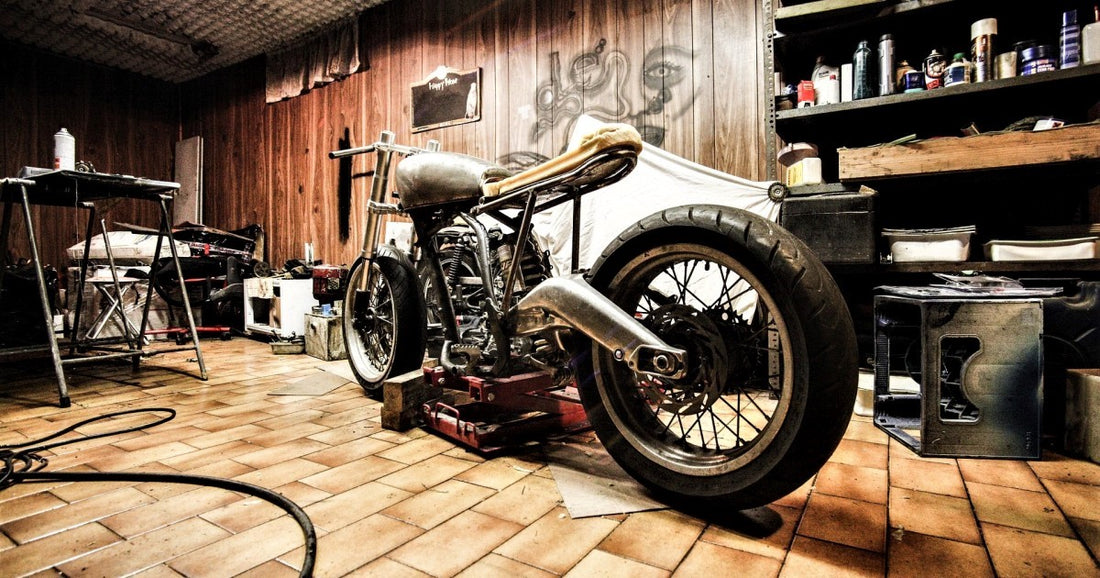Motorcycle Maintenance – The Definitive Guide to Caring For Your Ride
Keeping your motorcycle in top-notch condition is not just about keeping up appearances; it's about ensuring optimal performance and a long lifespan.
Whether you are a biking noob or a seasoned veteran of the road, understanding, if not mastering, the art of motorcycle maintenance is crucial.
Maintaining your motorcycle isn't as daunting as it may seem. With the right knowledge and a bit of practice, you'll be able to tackle routine maintenance tasks and minor repairs with confidence.
In this in-depth guide, we will explore the nitty-gritty of motorcycle maintenance, covering everything from oil changes to spark plugs. You will discover expert tips and tricks that will empower you to take control of your bike's upkeep, saving you time and money in the long run.
Whether you are looking to optimize performance, increase longevity, or simply want to learn more about the inner workings of your bike, this guide will help you rev up your skills and empower you to be mechanically self-reliant.
The Importance of Motorcycle Maintenance
Proper motorcycle maintenance is crucial for several reasons.
Firstly, it ensures that your bike performs at its best, delivering the power and responsiveness you expect. Regular maintenance also reduces the risk of breakdowns which can be costly, frustrating and inconvenient especially when on the road.
Another important reason to prioritize motorcycle maintenance is safety. Well-maintained motorcycles are less likely to experience mechanical failures that could lead to unfortunate incidents.
By taking the time to inspect and maintain your bike, you become an active participant in your own safety on the road.
Moreover, regular maintenance can extend the lifespan of your motorcycle. By replacing worn-out parts and addressing minor issues before they escalate, you can keep your bike running smoothly for years to come. This not only saves you money in the long run, but it also allows you to develop a deeper connection with your machine.
Basic Motorcycle Maintenance Tasks
To keep your motorcycle in top shape, there are several basic maintenance tasks that you should perform regularly.
The first and most fundamental task is checking the tyre pressure. Proper tyre pressure ensures optimal traction, stability, and fuel efficiency. Use a tyre pressure gauge to measure the pressure and inflate or deflate the tyres as needed.
Next, you will want to inspect the brakes. Check the brake pads for wear and tear, and ensure that the brake fluid is at the correct level. If you notice any issues, such as squeaking or reduced braking performance, it's crucial to address them promptly.
Another essential maintenance task is changing the oil. Engine oil lubricates the moving parts of your motorcycle's engine, preventing friction and heat buildup. Over time, oil breaks down and becomes less effective, so regular oil changes are necessary to keep your engine running smoothly. Refer to your motorcycle's manual for the recommended oil change intervals and follow the instructions carefully.
In addition to these tasks, it's important to regularly clean and lubricate the chain. The chain is a critical component that transfers power from the engine to the rear wheel. A dirty or dry chain can cause poor performance and even damage to other parts of the motorcycle. Clean the chain with a chain cleaner and lubricate it with a high-quality chain lube for optimal performance.
Essential Tools for Motorcycle Maintenance
Having the right tools is essential for effective motorcycle maintenance. While the specific tools you'll need may vary depending on your bike's make and model, there are a few basic tools that every motorcycle owner should have in their toolbox.
Firstly, invest in a good quality set of metric wrenches and sockets. These will come in handy for various maintenance tasks, including removing and tightening bolts and nuts. Additionally, a set of screwdrivers with different types and sizes will be necessary for removing and installing screws.
A torque wrench is another essential tool. It allows you to apply precise torque to bolts and nuts, preventing overtightening or undertightening, which can lead to damage or failure. Make sure to choose a torque wrench that covers the torque specifications required for your motorcycle.
For chain maintenance, a chain cleaning brush and a chain lubricant applicator are essential. The cleaning brush helps remove dirt and grime from the chain, while the lubricant applicator ensures even distribution of chain lube. This will help prolong the life of your chain and ensure smooth operation.
Lastly, a multimeter is a versatile tool that can be used for electrical troubleshooting. It allows you to measure voltage, resistance, and continuity, helping you diagnose and fix electrical issues on your motorcycle. Familiarize yourself with how to use a multimeter properly to get accurate readings.
Remember, having the right tools not only makes maintenance tasks easier but also ensures that you can perform them safely and effectively.
How Often Should You Perform Maintenance Tasks?
The frequency at which you should perform maintenance tasks on your motorcycle depends on several factors, including the bike's age, mileage, and usage.
However, there are some general guidelines that can help you establish a maintenance schedule.
For basic tasks such as checking tyre pressure, inspecting brakes, and cleaning and lubricating the chain, it's a good practice to perform these checks before every ride. This ensures that your bike is in optimal condition and reduces the risk of encountering issues while on the road.
Oil changes are typically recommended every 3,000 to 5,000 kilometers, but it's important to consult your motorcycle's manual for the manufacturer's specific recommendations. If you ride your bike more frequently or under harsher conditions, such as off-road or in extreme temperatures, you may need to change the oil more frequently.
Other maintenance tasks, such as checking and adjusting the clutch and throttle cables, inspecting the suspension components, and replacing the air filter are usually recommended at specific mileage intervals. Again, refer to your motorcycle's manual for the manufacturer's recommendations.
It's worth noting that establishing a regular maintenance routine and sticking to it is important. By performing routine maintenance tasks as recommended, you will catch potential issues early and ensure that your bike operates at its best.
Motorcycle Maintenance Checklist
To help you stay organized and ensure that you don't miss any maintenance tasks, here's a handy motorcycle maintenance checklist:
- Check tyre pressure and inflate or deflate as needed.
- Inspect brake pads and check brake fluid level.
- Change the oil as per your motorcycle's manual recommendations.
- Clean and lubricate the chain.
- Check and adjust clutch and throttle cables.
- Inspect suspension components for wear and damage.
- Replace the air filter if necessary.
- Test and replace spark plugs if needed.
- Check the battery and clean the terminals.
- Inspect and tighten all bolts and nuts.
- Clean and polish the motorcycle for a fresh look.
By following this checklist regularly, you will have peace of mind knowing that your motorcycle is in top condition.
Motorcycle Maintenance Tips and Tricks
Now that you have a solid understanding of the basics, let's explore some expert tips and tricks that will help you take your motorcycle maintenance skills to the next level.
- Keep a maintenance log: Create a logbook to record all maintenance tasks performed, including dates, mileage, and any notable observations. This log will help you track your maintenance history and identify any patterns or recurring issues.
- Use high-quality lubricants and fluids: Investing in high-quality lubricants and fluids is essential for optimal performance and longevity. Choose products that meet or exceed the manufacturer's specifications and follow the recommended intervals for replacement.
- Practice preventive maintenance: Don't wait for issues to arise before taking action. Regularly inspect your motorcycle for signs of wear or damage and address them promptly. This proactive approach can save you from costly repairs down the line.
- Learn from experienced riders: Join motorcycle forums and communities to connect with experienced riders who can offer valuable advice and share their maintenance experiences. Learning from others' mistakes and successes can help you become a more knowledgeable and skilled motorcycle owner.
- Keep your motorcycle clean: Regularly cleaning your motorcycle not only keeps it looking great but also helps prevent dirt and debris from damaging critical components. Use specialized motorcycle cleaners and polishes to protect the paint, chrome, and other surfaces.
- Invest in a motorcycle lift or stand: A motorcycle lift or stand can make maintenance tasks much easier and safer. It allows you to elevate your bike to a comfortable working height, giving you better access to various components.
Remember, practice makes perfect. The more you familiarize yourself with your motorcycle's maintenance needs and perform tasks regularly, the more confident and skilled you will become.
Common Motorcycle Maintenance Mistakes to Avoid
While motorcycle maintenance is essential, it's equally important to avoid common mistakes that can have detrimental effects on your bike's performance and longevity. Here are some mistakes to steer clear of:
- Over-tightening bolts and nuts: Applying excessive torque can strip threads or damage components. Always follow the manufacturer's recommended torque specifications and use a torque wrench for accuracy.
- Neglecting the chain: The chain is a critical component that requires regular cleaning and lubrication. Neglecting it can lead to poor performance, increased wear, and even chain failure. Keep the chain properly maintained to ensure smooth operation.
- Ignoring unusual sounds or smells: Pay attention to any unusual sounds or smells coming from your motorcycle. These can be early warning signs of underlying issues. Address them promptly to prevent further damage or breakdowns.
- Using incorrect oil or fluids: Always use the oil and fluids recommended by the manufacturer. Using the wrong type or grade of oil can lead to poor engine performance, increased wear, and potential damage.
- Skipping maintenance tasks: It's easy to put off maintenance tasks or overlook them altogether, especially when everything seems to be running smoothly. However, regular maintenance is crucial for long-term performance and reliability. Stick to your maintenance schedule and don't skip any tasks.
- Rushing through tasks: Motorcycle maintenance requires patience and attention to detail. Rushing through tasks can lead to mistakes or overlook potential issues. Take your time and follow the recommended procedures carefully.
By avoiding these common mistakes, you will ensure that your motorcycle remains in excellent condition and delivers the performance and reliability you expect.
Advanced Motorcycle Maintenance Tasks
Once you have mastered the basics of motorcycle maintenance, you may be ready to tackle more advanced tasks. These tasks require a higher level of technical knowledge and skill, so it's important to proceed with caution and seek guidance if needed.
Here are a few advanced maintenance tasks to consider:
- Valve clearance adjustment: Over time, the clearance between the valves and the camshaft can change, affecting engine performance. Adjusting the valve clearance requires precision and knowledge of your motorcycle's specific specifications. Consult your motorcycle's manual or seek professional assistance.
- Carburetor cleaning and tuning: Carburetors play a crucial role in fuel delivery and engine performance. Cleaning and tuning the carburetors can help optimize fuel efficiency and power output. This task can be complex, so it's advisable to learn from experienced riders or seek professional help.
- Suspension setup and tuning: Proper suspension setup helps ensure a smooth and controlled ride. Advanced riders may choose to fine-tune their suspension settings to suit their riding style and preferences. This task requires knowledge of suspension components and adjustments, so take the time to research and consult experts.
- Electrical system troubleshooting: Electrical issues can be challenging to diagnose and fix. Advanced troubleshooting may involve testing components, checking wiring connections, and using a multimeter to measure electrical values. If you're not confident in your electrical troubleshooting skills, it's best to consult a professional.
Advanced maintenance tasks require a higher level of expertise, so it's essential to know your limits and seek assistance when necessary. Safety should always be the top priority.
When to Seek Professional Help for Motorcycle Maintenance
While it's empowering to be able to perform routine maintenance tasks on your own, there are instances when seeking professional help is the best course of action.
Here are some situations where professional assistance may be necessary:
- Complex repairs: If you're facing a major mechanical issue or a complex repair, it's best to leave it to the professionals. They have the expertise, tools, and resources to diagnose and fix complex problems effectively.
- Lack of knowledge or experience: If you're unsure about a particular maintenance task or lack the necessary knowledge or experience, it's safer to seek professional help. Attempting tasks beyond your skill level can lead to further damage or safety hazards.
- Warranty considerations: If your motorcycle is still under warranty, it's essential to follow the manufacturer's recommended maintenance schedule and have authorized service centers perform the required tasks. This ensures that your warranty remains valid and protects you from any potential issues.
- Time constraints: If you have limited time or prefer to spend your time riding rather than wrenching, outsourcing maintenance tasks to professionals can be a convenient option. They can efficiently perform the necessary tasks, allowing you to focus on enjoying your motorcycle.
Seeking professional help when needed doesn't diminish your skills or passion for motorcycles. It's a smart decision that ensures your bike receives the best care and attention when necessary.
Key Takeaways
Mastering the art of motorcycle maintenance is a journey that requires dedication, knowledge, and practice. By understanding the importance of maintenance, learning the necessary tasks, and investing in the right tools, you can take control of your bike's upkeep and enjoy your biking escapades without any worries.
Remember to perform routine maintenance tasks regularly, follow your motorcycle's maintenance schedule, and seek professional help when needed. By doing so, you will optimize your bike's performance and increase its lifespan.
Your bike deserves the best care, and you deserve the best of adventures that it has to offer.






